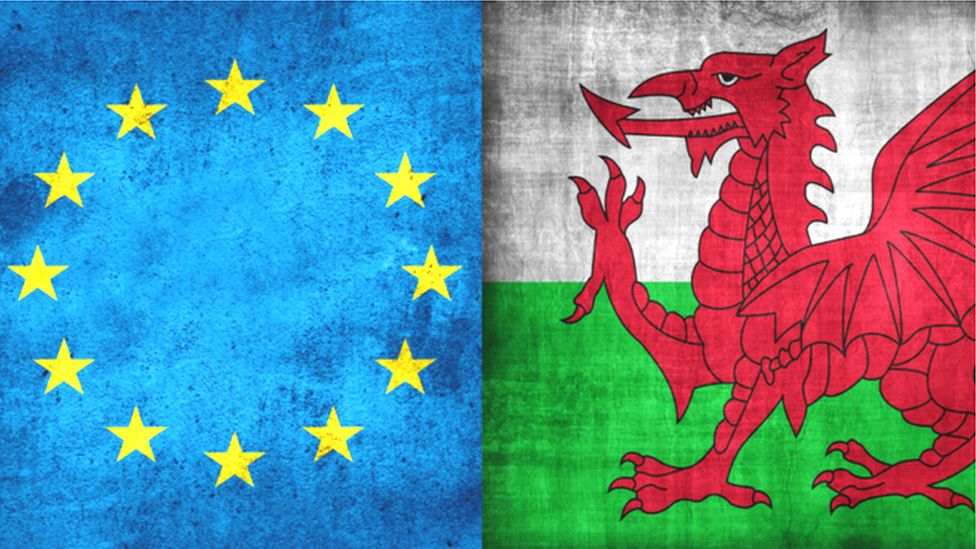Poll for BBC Wales on Brexit attitudes and voting
- Published

Voters are increasingly pessimistic about the economic outlook for Wales after Brexit, according to the annual BBC Cymru Wales St David's Day poll.
The poll, carried out by ICM, found 49% thought Brexit would have a negative impact with 24% thinking positive.
In the 2017 poll, the results were 44% negative and 33% positive.
On personal finances, 14% thought Brexit would be positive and 36% negative, while 41% thought it would make no difference.
Last year, 17% thought Brexit would be positive, 30% negative and 45% no difference.
On voting in a Westminster election, Prof Roger Awan-Scully at Cardiff University's Wales Governance Centre has calculated that, using the assumption of uniform national swings since 2017, the Tories would lose the Preseli Pembrokeshire seat to Labour.
The overall projection would be Labour 29 MPs, Conservatives seven MPs and Plaid Cymru four MPs.
For a Welsh Assembly election, the poll suggests Labour would win 30 seats (27 constituency, three regional), Plaid Cymru 15 seats (six constituency, nine regional), Conservatives 13 seats (six constituency, seven regional), UKIP one seat (regional) and Liberal Democrats one seat (constituency).
On the regional vote, the percentages are Labour 36%, Plaid Cymru 22%, Conservatives 21%, UKIP 8%, Liberal Democrats 6% and others 5%.
Analysis by Vaughan Roderick, BBC Welsh Affairs Editor
The stark contrast between the continuing turmoil in the political world - over issues as diverse as Brexit and the future of Carwyn Jones - and the seeming immovability in the electorate's voting intentions is, to say the least, puzzling.
In assembly terms, support for Labour has increased despite all the questions surrounding the death of Carl Sargeant, while at the Westminster level the Conservatives are holding steady despite the infighting in the UK government over Brexit.
The likeliest explanation for the electoral stasis is the polarisation caused by the EU referendum with the Conservative Leave voters providing the party with a floor beneath which the party's support can't drop.
Labour leavers on the other hand, motivated by issues other than the EU, seem happy to continue to support the party, even as it moves cautiously towards a more pro-EU stance.
On Brexit itself, the growth in pessimism about the likely effect on the Welsh economy is striking. However, while voters continue to feel that they personally won't feel the economic impact, Leave supporters driven by issues like immigration are unlikely to change their views.
Prof Roger Awan-Scully of Cardiff University reflects on the poll's findings on Brexit
Asked to choose their preferred option for the future of devolution, 44% of those questioned said they wanted an assembly with greater powers - the same figure as a year ago.
This option has been the most popular in every poll for BBC Wales since it was first asked in this format in 2010.
The status quo is preferred by 28%, down one point from last year, with 4% wanting an assembly with fewer powers and 12% wanting the assembly abolished.
Support for abolition has remained stable since the Scottish independence referendum in September 2014, having previously been as high as 23% in March 2014.
But only 7% back the idea of Welsh independence, up one point from 2017 and in the 2015 poll. Support has been under 10% since 2011.
Asked about a tax on disposable plastic - such as disposable coffee cups - more than three-quarters (76%) of those questioned said they would support the idea, with 17% opposed.
On bullying and harassment in the workplace, 16% said they had experienced it in the past five years, with 6% saying they had experienced sexual harassment or assault.
Verbal abuse had been experienced by 24%, while 7% said they experienced assault or physical violence.
ICM Unlimited interviewed a representative sample of 1,001 adults aged 18+ by telephone on 8-25 February 2018. Interviews were conducted across Wales and the results have been weighted to the profile of all Welsh adults. ICM is a member of the British Polling Council and abides by its rules.